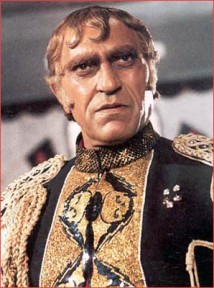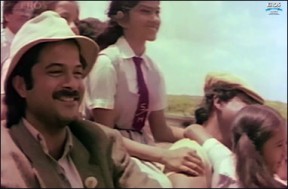My four-year-old eyes sparkled with wonder as I watched scene after scene unleash the magic of Mr India for the first time on the big screen. I watched it yesterday on television for the nth time and trust me, the magic has stayed alive.
Who can forget Anil Kapoor as the ragged violinist with a golden heart? From the dirty hat on his head down to his torn shoes, Arun Bhaiyya was the quintessential symbol of the times. It is still difficult to find actors like Kapoor who are so open and ready to flow in front of the camera. The only person who could have matched his spontaneity was Sridevi and this was one of her best performances although from her repertoire of films, it is very difficult to single out any.
Who can forget the megalomaniac Mogambo? Amrish Puri, in his golden regalia looked the part of a global villain to the hilt and sent shivers down my spine as a kid. But then he did that with his baritone and angry eyes in Dilwale Dulhaniya Le Jaayenge too. And who can forget the dozen or so children pleading for their football, Calendar the cook, the henchmen Daaga and Tejaa being whipped by Mr India in the Jai Bajrang Bali scene and even Annu Kapoor as the almost driven-to-madness editor of a newspaper.
I think what really worked for the film was the fact that it maintained a single tone from the beginning to the end. It set out to be a comic fun caper to be enjoyed by children and adults alike and that is what it was. Yes, there were tear-jerker moments in the film. I cried again in the scene where the children have been hungry for two days and when Sridevi offers them food, the terribly hungry little girl takes it but before taking a bite herself, offers it to her mates first. But by and large the film retained its sense-of- humour even in the most serious situations. Remember the scene where the hero, heroine and the kids are caught and jailed in Mogambo’s prisons? When they are making a run for it, they suddenly come across Mogambo’s soldiers and Sridevi suddenly raises her arm and blurts out “Hail! Mukijambo!” I still rolled with laughter after this one.
I believe this was the first time children were captured on screen in the most natural way (apart from Masoom, another Shekhar Kapoor film) and not as characters mouthing adult dialogues. Among the 12 of them, there were at least one or two who looked like one of our siblings or cousins and we would smile every time they appeared on screen. Ms Hawa Hawaai remains one of my favourite characters till date. Javed Akhtar’s immortal line ‘Mogambo Khush Hua’ is something I still wait for, but what brought the house down was the climax where Mr India clearly states that he would fight Mogambo as a common man and not as a superhero with magical powers. The film refuses to be pitiful and maudlin despite hungry, poor children; it refuses to be apologetic about having a commoner as a protagonist who still is uncommon because of his human qualities. Yes, there was a lot like Shammi Kapoor’s Brahamchari in the film and yet, it had a spunk of its own.
I think what I love most is that Mr India belongs to a far more innocent time. A time where ideals were still held high despite the poverty one was living in. A time, where we believed in the hero; the commoner who would sort out all problems with his own inner strength. A time, where the villain was still a foreigner (mostly an Indian with a blonde wig or the late Bob Christo). A time where films believed and so did we that all would be well in the end.
Thank you, Shekhar Kapur for making a film like Mr India. It still makes me believe in magic. Yes, more so than even Harry Potter.
Roopal Kewalya is a film graduate from NID, Ahmedabad and has been an active independent writer for television, short films and even song lyrics for various organizations. She has also had short stints as a stage actor, a radio jockey for FMII and loves to dabble in all things creative.








brought back memories.
thank you